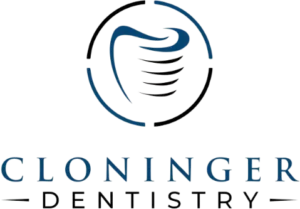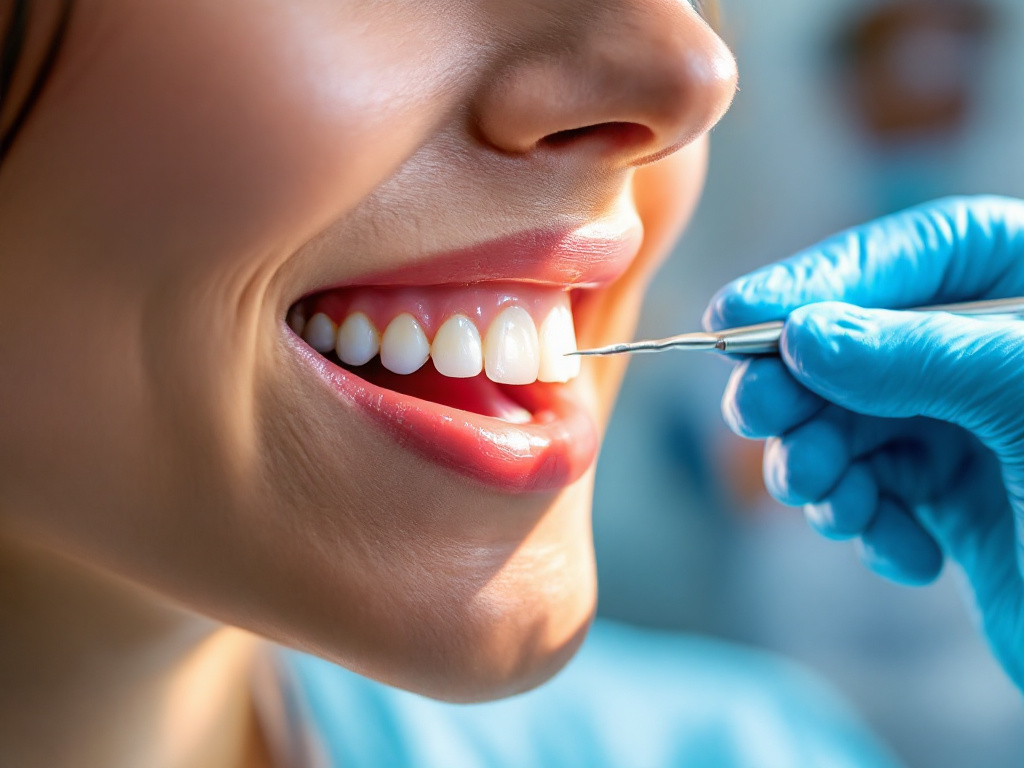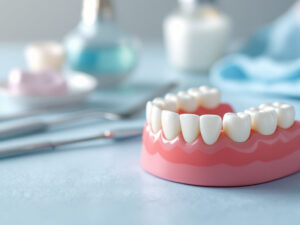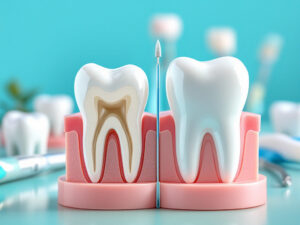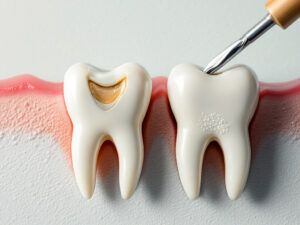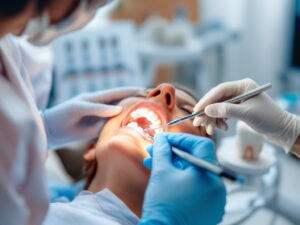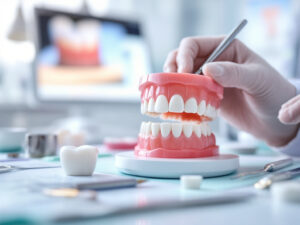You chip a tooth when a fragment of enamel or dentin breaks off due to trauma or biting something hard. If you need to repair chipped tooth, you’ll want to understand what happened, recognize symptoms, and explore reliable treatment paths in restorative dentistry. In this article, you’ll learn how to identify causes and warning signs, compare repair options from fillings to crowns and implants, review costs and insurance considerations, and take preventive steps to protect your smile. Whether your chip is minor or severe, you’ll gain the knowledge you need to make informed decisions and restore your tooth with confidence.
Understand chipped tooth
A chipped tooth occurs when the outer protective layer (enamel) or the layer beneath it (dentin) fractures under pressure. Enamel does not regenerate on its own, so even a small chip requires professional attention to prevent further damage or infection [1].
What is a chipped tooth?
When you bite down on something hard or suffer a blow to the face, a piece of enamel may break off. If the chip is confined to enamel, you might only notice a rough edge. But if it extends into dentin or exposes the pulp, you can experience sharp pain, sensitivity, or even bleeding. A missing fragment will not grow back, so you’ll need restorative dentistry to protect the tooth’s structure and nerve.
Tooth anatomy basics
- Enamel: Hard, outermost layer, protects against decay and wear
- Dentin: Softer layer beneath enamel, transmits sensations to nerves
- Pulp: Innermost core containing nerves and blood vessels
- Cementum: Covers the tooth root, anchors it in the jaw
Understanding these layers helps you appreciate why prompt repair is crucial, especially if dentin or pulp becomes exposed.
Identify causes and symptoms
Knowing what led to your chipped tooth and spotting warning signs lets you act quickly and reduce risk of complications.
Common chipping causes
- Accidents or falls, especially during contact sports
- Biting down on hard objects like ice, nuts, or pens [2]
- Teeth grinding or clenching (bruxism), which weakens enamel over time [3]
- Acid erosion from sodas, fruit juices, or acid reflux, which softens enamel
- Misaligned bite placing uneven pressure on certain teeth
Symptoms to watch for
- Visible missing fragment or jagged edge on your tooth
- Sharp discomfort when chewing or biting
- Sensitivity to hot, cold, sweet, or acidic foods and drinks [2]
- Pain if the pulp is exposed
- Cuts or sores on your tongue from the sharp edge [4]
If you notice any of these symptoms after trauma or hard bite, plan to see your dentist promptly to avoid infection or worsening damage.
Evaluate treatment options
Your repair plan depends on the chip’s size, location, and whether sensitive tissue is involved. Here are common approaches:
Minor chip solutions
When enamel alone is affected, simple fixes can restore form and comfort.
Dental bonding
A tooth-colored composite resin bonds to the chipped area, sculpted and polished to match your tooth. This quick, cost-effective method typically requires no anesthesia and can be completed in one visit [5].
Tooth-colored filling
For slightly larger chips, your dentist may use a durable filling material to rebuild the missing portion. This approach preserves your natural tooth and restores strength.
Moderate chip repairs
If your chip affects appearance or risks further damage, more robust restorations can help.
Dental veneers
Thin porcelain or composite shells custom-made to cover the front of your tooth. Veneers conceal cracks and chips, offering a lifelike finish and added protection.
Porcelain crown restoration
A crown encases the entire visible portion of your tooth, restoring shape and strength. Porcelain crowns resist staining and mimic natural enamel texture.
Severe chip restorations
When the pulp or root is involved, you’ll need comprehensive care to save the tooth.
Root canal and crown
If a chip exposes the pulp, root canal therapy cleans out damaged tissue and seals the canal. A crown placed afterward restores function and prevents reinfection [5].
Dental implants
For chips so extensive that the tooth cannot be saved, an implant plus crown replacement can fully restore function and aesthetics. This option also prevents bone loss in the jaw.
Treatment comparison table
| Treatment | Ideal for | Estimated cost |
|---|---|---|
| Dental bonding | Small enamel chips | $300–$600 [6] |
| Tooth-colored filling | Small to moderate chips | $200–$400 [6] |
| Veneer placement | Moderate front-tooth chips | $900–$2,500 [6] |
| Crown with root canal | Severe chips exposing pulp | $1,270–$3,200 [7] |
| Dental implant and crown | Large fragments or non-salvageable tooth | $2,000–$7,000 [6] |
Explore restorative services
Professional repair leverages specialized services to meet your needs.
Composite bonding and fillings
Our composite filling service uses high-grade resin for seamless cosmetic repair. Bonding restores shape and color in one visit, while tooth-colored fillings reinforce tooth structure.
Crown and bridge dentistry
For moderate to severe chips, consider dental crown placement or crown and bridge dentistry. Crowns protect weakened teeth, and bridges fill gaps when a chipped tooth must be removed entirely. You can also explore porcelain crown restoration for a natural look.
Implant restoration options
When a chip leads to tooth loss, our implant restoration dentist can replace your tooth with a titanium implant and custom crown. We also offer dental bridge replacement and custom denture services for multi-tooth restorations. For cracked or broken restorations, visit our repair broken dental work and repair cracked tooth dentist pages.
Assess cost and coverage
Understanding expenses and insurance options helps you plan treatment without surprises.
Treatment cost ranges
Repairing a chipped tooth can cost anywhere from a few hundred to several thousand dollars, depending on the procedure:
- Fillings or bonding: $200–$600
- Veneers: $900–$2,500
- Crowns with root canals: $1,270–$3,200
- Implants: $2,000–$7,000
Insurance covered restorative dental
If a repair is medically necessary, your plan may cover a portion of costs. Learn more about insurance covered restorative dental for details on deductibles, copays, HSAs, and FSAs.
Financing and payment plans
Many practices offer in-office financing or third-party payment plans. Ask your provider about interest-free options and sliding-scale fees if up-front costs are a concern.
Prevent future dental damage
Taking proactive steps can reduce the risk of chips and other fractures.
Protective mouthguards
If you play contact sports or grind teeth at night, wearing a custom mouthguard shields enamel from impact and wear.
Healthy eating and habits
- Avoid chewing ice, popcorn kernels, or hard candies
- Limit acidic drinks like soda and fruit juice [2]
- Practice good oral hygiene to keep enamel strong
- Address bruxism early with a nightguard
Seek professional dental care
Knowing when to call your dentist ensures timely, effective treatment.
Emergency warning signs
Head to the ER if you experience:
- Dislocated jaw or fractured bone
- Difficulty swallowing or breathing
- Persistent bleeding that won’t stop
For less severe cases, contact your dental team to schedule a same-day visit [8].
Choosing the right dentist
Look for a provider experienced in restorative dental procedures and dentistry for damaged teeth. Whether you need a simple filling with a tooth filling dentist, advanced root canal therapy, or full tooth repair and restoration, choose a clinic that offers comprehensive dental prosthetics services and a track record of quality results.
Once you understand your options and costs, you can move forward with confidence. Repairing a chipped tooth protects your smile and prevents future complications. Reach out today to schedule a consultation and restore your tooth’s health and appearance.
